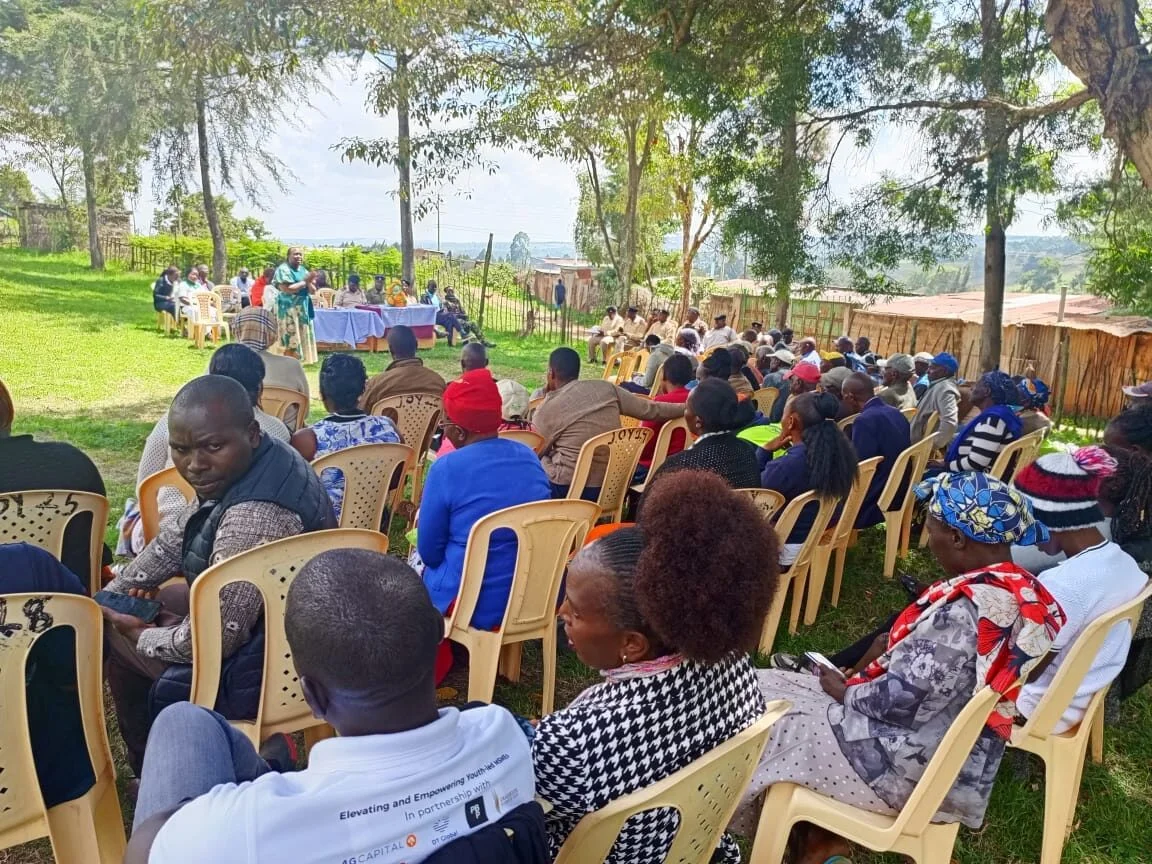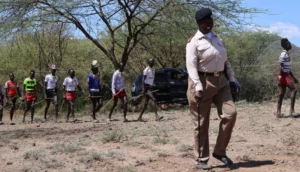
Addressing the root causes of Gender Based Violence requires comprehensive strategies, including education, economic empowerment, robust legal systems, and cultural transformation that promote gender equality and challenge harmful norms.
The Community Engagement Forum in Sachangwan, Molo Sub County, was a testament to the power of collaboration. It formed part of the global 16 Days of Activism Against GBV, held annually from November 25 to December 10, and aligned with this year’s theme, emphasizing localized, collaborative approaches to addressing gender-based violence.
Representatives from MIDRIFT HURINET, the Nakuru County Government, the National Government Administrative Officers (ACC & Chief), the Sachangwan Police Post, and the Sachangwan Health Centre were present.
From the discussions in the forum, it emerged that deeply rooted patriarchal norms and power imbalances perpetuate the subjugation of women and marginalized genders, normalizing violence as a means of control, Traditional beliefs that prioritize male dominance, condone harmful practices like child marriage or female genital mutilation, and stigmatize survivors of GBV contribute significantly to its prevalence, Poverty and financial dependence make victims more vulnerable to abuse, as they lack the resources or support systems to leave abusive environments, Inadequate laws, poor enforcement, and impunity for perpetrators discourage survivors from seeking justice and enable the continuation of violence, limited understanding of rights and gender equality among both genders fosters environments where GBV is tolerated or ignored and in areas affected by conflict, displacement, or political instability, GBV often increases due to weakened societal structures and the use of violence as a weapon of the conflict.
In a previous engagement forum facilitated by MIDRIFT HURINET in Njoro Sub County that brought together National Government Administrative Officers as an essential referral component, patriarchy was listed as an enabler of Gender-based Violence.
The nexus between patriarchy and the root causes of Gender-Based Violence (GBV) lies in the systemic structures and cultural norms that perpetuate male dominance and gender inequality.
Patriarchy enforces power imbalances by assigning authority and privilege to men while marginalizing women and other genders.
This imbalance creates environments where violence is used as a tool of control, reinforcing societal roles and expectations that devalue women and justify abuse.
At the heart of patriarchy is the normalization of harmful stereotypes, such as men being seen as aggressors and women as submissive.
These stereotypes not only trivialize violence but also stigmatize survivors, discouraging them from seeking help.
In patriarchal societies, cultural practices like child marriage, dowry systems, and honor-based violence further solidify GBV as a socially acceptable mechanism for maintaining male dominance.
Patriarchy also perpetuates economic inequality, leaving women disproportionately dependent on men. This financial reliance reduces their ability to leave abusive relationships and increases their vulnerability to exploitation. Furthermore, weak legal systems, shaped by patriarchal biases, often fail to protect victims or hold perpetrators accountable, further embedding GBV into societal structures.
Breaking the link between patriarchy and GBV is a collective responsibility. It requires each of us to challenge gender norms, empower women economically and socially, and foster equitable systems that uphold the rights of all individuals regardless of gender.
Transformative education, community-led initiatives, and strict enforcement of anti-violence laws are critical to dismantling patriarchal foundations and reducing GBV.
As a measure of ending patriarchy, community members gave the following solutions;
Schools should integrate curriculums that teach boys and girls about shared responsibilities, respect, and the importance of equity from a young age. Community workshops and storytelling sessions can provide platforms for sharing experiences and confronting patriarchal norms. Highlighting role models who defy traditional gender roles inspires younger generations to embrace change. Programs that support women with vocational training, access to credit, and mentorship empower them to take leadership roles in business and society. Expanding women’s access to agricultural resources and land rights is particularly impactful in Kenya, as agriculture remains a primary livelihood.
Digital platforms and media can be leveraged to challenge stereotypes and amplify the voices of women and gender equality advocates. Campaigns that use local languages and relatable stories can resonate with diverse audiences. Social media influencers can mobilize younger audiences, promoting feminist values and normalizing equitable partnerships.
Initiatives like male mentorship programs and ‘HeForShe’-style campaigns, which encourage men to challenge toxic masculinity, share household responsibilities, and actively advocate for gender equity within their families and communities, were also discussed.
These initiatives aim to engage men as allies in the fight against GBV, promoting a more inclusive and equitable society.
Collaborate with cultural custodians to reinterpret traditions that honor heritage while promoting gender equality. For example, some communities in Kenya are creatively reframing rites of passage to celebrate both boys and girls equally, dismantling practices like female genital mutilation (FGM) while preserving communal pride.
Community members engaged actively, pledging to challenge GBV daily and promote respect and inclusivity. Their active participation and commitment to change demonstrate the power of community engagement in addressing GBV, inspiring others to join the cause, and fostering a sense of collective responsibility.
Community members were not just participants but active agents of change. They pledged to challenge GBV daily and promote respect and inclusivity, demonstrating their commitment and crucial role in this collective effort.
They also agreed on Creating safe spaces for survivors to share their experiences without judgment, disbelief, or blame. Validation begins by affirming their emotions and ensuring they feel heard and respected.
Recognizing the profound effects of GBV on survivors’ mental, emotional, and physical well-being. This includes affirming that their reactions and feelings are valid, offering resources such as counseling, legal aid, or medical care, connecting survivors to systems that empower and assist in their recovery process, and educating their community members about GBV to challenge stigma, preventing violence, and foster environments that support survivors while holding perpetrators accountable.
By
Jacob Karani




